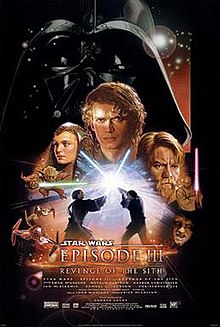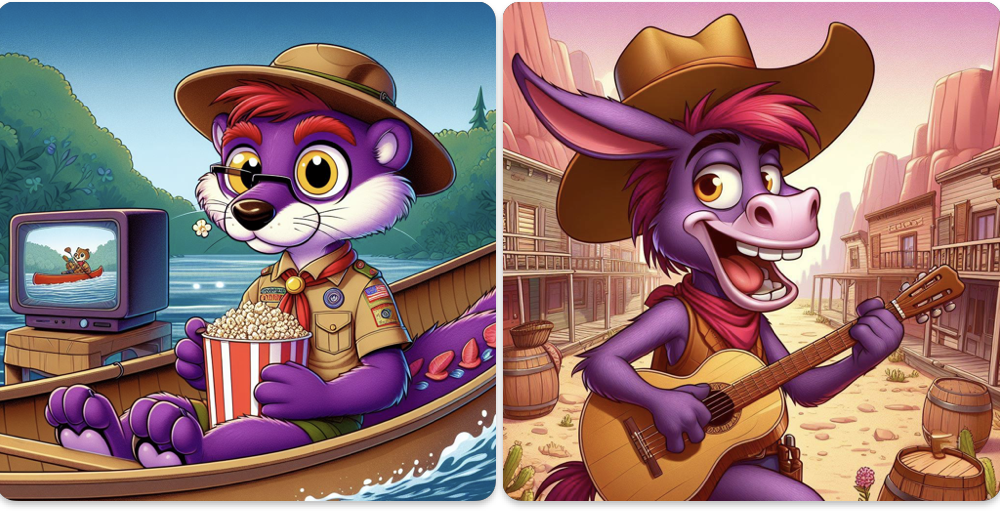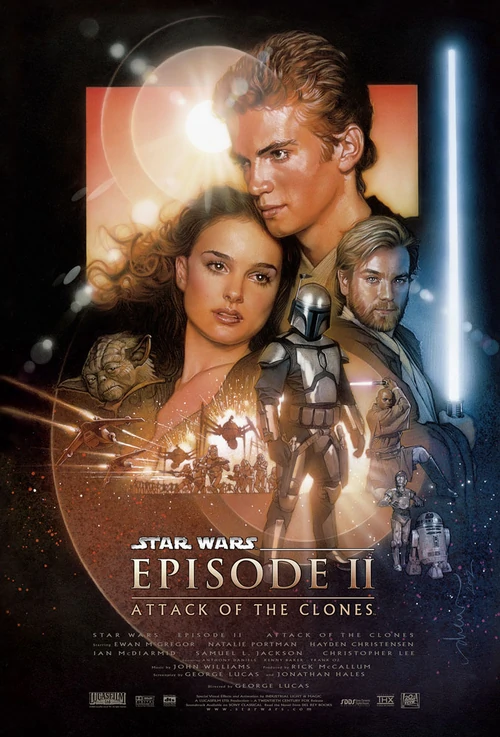
Spoilers for those unfamiliar with the franchise.
The third and final installment of the eternally-polarizing Star Wars prequel trilogy opens with the off-screen kidnapping of Supreme Galactic Chancellor Sheev Palpatine by General Grievous, leader of the droid armies of the Separatists (which doesn’t have a canon on-screen occurrence, even in the extended Clone Wars television series or in the canon books, unless I’m mistaken). Personally, were I in charge of writing the opening crawl, I would have included something about Anakin’s imminent plight to the Dark Side of the Force, although the quote “There are heroes on both sides. Evil is everywhere” I think accurately describes politics, particularly in America’s duopolized system.
Anakin Skywalker and Obi-Wan Kenobi are tasked with rescuing the captive Chancellor from Grievous and Sith Lord Count Dooku, whom the Jedi duo duels on his ship above the city-planet Coruscant, afterwards crash-landing the vessel. When Anakin reunites with his secret wife Padmé Amidala, he learns that she is pregnant, with her unborn offspring until the last minute referred to as “the baby”, and I somewhat find it odd that Anakin and Obi-Wan in particular, who spend the most time around her, couldn’t sense multiple lives within her womb, despite their Jedi senses, and surely some sort of prenatal screening would have clued her into her twin pregnancy since she was obviously aware.
The final battles of the Clone Wars occur chiefly on the planets of Utapau, where Obi-Wan confronts General Grievous, and on the Wookiee homeworld of Kashyyyk, where Yoda spends significant time, having interaction with original trilogy character Chewbacca. On Coruscant, Palpatine gradually lures Anakin to the Dark Side with the tale of the tragedy of his old Sith Master, Darth Plagueis the Wise, who could manipulate life itself before his ultimate betrayal. Here, the Force having a biological basis in midi-chlorians actually has some significant basis, with a Darth Vader spinoff comic hinting that Palpatine may have had a hand in Anakin’s conception in Shmi Skywalker.
Palpatine chiefly preys on Anakin’s visions of losing his wife in childbirth, similar to those he had before the death of his mother on Tatooine at the hands of the Tuskens, and feels that turning to the Dark Side can save her, despite the secret Darth Sidious not giving any sort of apparent education in his deceased Master’s dark teachings. The Chancellor also appoints Anakin to be his representative on the Jedi Council, which they accept, although he doesn’t receive the rank of Master, which upsets him. I think a better quote in this situation would have been, “We accept your appointment to the Council, but do not grant you the rank, privilege, or voting power of a Master.”
Playing a significant part in the film’s latter events is the Chancellor’s Order 66, which turns the clone soldiers, genetically-created to follow orders blindly, against their Jedi Generals. I actually don’t feel sorry for the Jedi, since their teachings didn’t give any emphasis on defense against the powers of the Dark Side, and Anakin, knighted Darth Vader after he saves the Chancellor from arrest and death at the hands of the Jedi, storms the Jedi Temple of Coruscant in the beginning of his genocide against the Order. One could argue that Anakin was actually somewhat fulfilling the Chosen One prophecy in his decimation of the Jedi, balancing Light and Dark Side followers, given the latter’s “Rule of Two”, and Vader actually had every right to be angry at the Order given he would have possibly saved his mother had the Jedi not severed his contact with her.
Padmé is somewhat equally and unintentionally unsympathetic as the Jedi, since she really should have known what she was getting into when she became intimate with Anakin, and even as a child, Anakin showed potential genocidal tendencies, given his destruction of a likely-alien-inhabited Trade Federation ship in Episode I, and slaughter of the Sand People that killed his mother. Padmé also thinks her husband incapable of his atrocities, despite having in Episode II confided in her about his killing the Tuskens. Her death was also arguably forced; you could say postpartum depression and/or a broken heart (which I actually somewhat believe is possible), but given what she went through during the Clone Wars, she definitely got out of worse scrapes than childbirth.
Obi-Wan also is arguably not a good hero in that he fails to prevent every major tragedy in the franchise, given the Jedi, who were initially reluctant to take on Anakin as an apprentice, were actually somewhat right in their reluctance, and that he adopts an alias that includes his real last name (Ben Kenobi), while living in exile on Vader’s homeworld Tatooine near his stepfamily (although Kenobi’s respective Disney+ series shows he doesn’t get off completely scot-free). He was also potentially sexist, given his view in Episode V that Luke was the Galaxy’s last hope, Yoda having to remind him “No; there is another,” which I think would have been better worded as “Do not forget; there is another.” Obi-Wan reiterates his claim in Episode VI, with Luke noting as well that Yoda “spoke of another.”
Ultimately, the film culminates in tragedy with a duel between Anakin and Obi-Wan on the lava planet Mustafar that leaves the former scorched, and put on life support when returned to Coruscant by the new Galactic Emperor Palpatine. Luke and Leia are born and separated, the latter whom the royal family of doomed Alderaan adopt. The last scene, where Obi-Wan delivers the infant Luke to his stepaunt and stepuncle on Tatooine, was beautiful, aurally (the first part of the music a melancholy remix of the opening crawl music) and visually (with the setting of the twin suns and all), and nigh-impossible for me to watch with dry eyes, serving as a reminder that even in the darkest times, there is still hope.
Overall, the Star Wars film franchise as a whole has very much been a subject of my many arguments over the internet, especially with those who consider the original trilogy infallible (which I personally don’t, as Episode III shares many issues with its chronological predecessors and successors), and I feel that the series has been far more about flashy effects and battles, and to a lesser extent the characters, than good writing (and even the “best” film, The Empire Strikes Back, has some holes, and I don’t think Lawrence Kasdan is any better a writer than George Lucas). Generally, I would consider the franchise’s writing simultaneously good and bad, good in that there are a lot of genuine awesome and emotional moments, bad in that there are said holes in their stories and questionable narrative decisions.
I definitely don’t think the film, or others in the Star Wars series, is a masterpiece, but I think it definitely qualifies as “culturally or historically significant,” since it has some good sociopolitical commentary (even if some is ham-fisted) about things like the dangers of love, the fragility of democracy, the nature of war, and such. Many of the “flaws” film critics complain about in the film are in the original trilogy, and I’m tired of movie reviewers and even the franchise’s alleged “fans” as a whole considering certain films infallible, and pretending certain ones are better (or worse) than they actually are. Personally, I liked the prequels more than the sequel trilogy since the prequel trilogy isn’t a case of real life writing them, and again, as Lucas said, “It’s the story of a family, and it has to start somewhere.”










